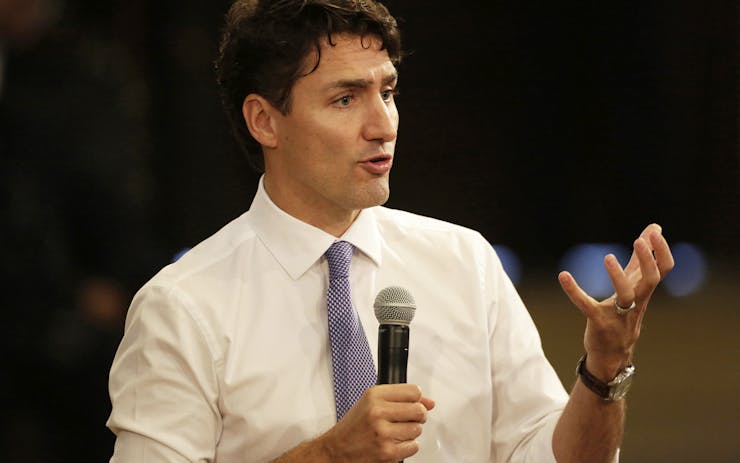Canadian Prime Minister Justin Trudeau sat down Monday with reporters and staffers from Vice for a live interview about the recently introduced legislation to legalize cannabis. Over the course of an hour, he fielded questions—including from celebrities like Seth Rogan and cannabis activists like Jodie Emery—about what the changes will mean for the country.
Here are five key takeaways from the discussion:
Medical Isn’t Going Anywhere—For Now
Trudeau told the audience that Canada learned a lot from legal-cannabis states in the US, which may be part of the reason he’s pledged to leave the country’s medical cannabis program untouched, at least for the time being. Patients in some US states have seen medical markets dry up as adult-use legalization took over, forcing them to pay more for different products.
Trudeau says that won’t happen—at least not anytime soon. “The medical marijuana system that exists in Canada will stay as-is for the coming years,” he told the Vice audience.
Trudeau said he even believes nonmedical legalization could help federal lawmakers to “make better determinations” about how to regulate the medical market. Currently “a lot of people” use the medical system to purchase cannabis for recreational purposes, he said. As those people transition to the adult-use market, it will “radically transform the environment in which the medical marijuana system currently works,” allowing regulators to respond accordingly.
Don’t Expect the Raids to Stop Soon
While nationwide cannabis legalization is only about a year away in Canada, Trudeau insisted on the importance of enforcing current cannabis laws. He shot down ideas like a moratorium on new criminal charges or the possibility of nationwide decriminalization in the interim.
“Until we have a system in place that is a better system than our current system, our system has to stand,” he said. “If you decriminalize, the only people who will be growing and selling are going to be criminals themselves.”
Trudeau faced some pushback for staying the course, at least from the Vice audience. A big point of contention was the degree to which a criminal conviction can affect a person’s life for years down the road. A recent Vice poll found that 56% of Canadians support a blanket pardon for past cannabis offenses, and 35% support pardons for possession. Only 9% percent opposed pardons of any kind.
Edibles: A Lot to Chew On
Sales of cannabis-infused edibles won’t be permitted in Canada, meaning consumers who want to skip smoking and eat a brownie instead will have to buy cannabis flower or concentrate and make edibles at home. That’s irked some consumers—especially following a Canadian Supreme Court decision saying medical edibles are OK—but Trudeau on Monday stood by the policy.
“We don’t yet have full confidence that we know what a regulated framework around edibles will look like,” he acknowledged, pointing to anecdotes of overconsumption-by-edibles in states like Colorado. “We have to get it right.”
Asked how he expected to make a dent in the illegal market without allowing edibles, Trudeau acknowledged that was a problem for another day. “That next step, we’re going to be working on it,” he said. “It’s in the future.”
Under the Banner of Safety
Nearly all of Trudeau’s talking points on legalization stressed public safety as the legislation’s driving principle. It’s the reason he stood by the edibles ban, the explanation behind continuing to enforce the country’s cannabis laws, and the motivation behind trying to keep the industry in check.
“I’m more of a beer and bourbon guy.”
US states, Trudeau said, have approached cannabis legalization “very much with a commercial mindset and already thinking about profits and revenue,” he said. “We’re approaching it purely from a health and safety standpoint.”
Public safety was Trudeau’s justification for a number of policies, such as the need for strict federal oversight of cannabis production and why it’s important to keep shutting down storefront dispensaries that are operating illegally. It’s also been the official justification for setting the legal age for cannabis at 18 under the new law and for imposing strict limits on advertising.
Trudeau: Not Exactly a Cannabis Guy
The first question to the prime minister was about the last time he tried cannabis. His response? “My high-school friends, everyone who’s known me a long time, thinks it’s just really, really funny that I’m the one in charge of legalizing marijuana” he said, describing himself as “the boringest.”
“Convincing me to move toward legalization was very much done on a policy basis,” he explained.
In other words, he’s no Barry Obama, whose affinity for cannabis during his college years is widely known. He’s pragmatic, policy-minded, and, well… not all that interested in consuming cannabis.
“I’m more of a beer and bourbon guy,” he said in response to a question about how he planned to celebrate legalization’s success.
Canadian Craft Cannabis?
Federal officials will oversee cannabis cultivation under the new law. That’s worried some consumers, who fear a small number of large companies could control the entire supply—as so-called “licensed producers” do in the country’s medical market. But Trudeau assured the Vice audience that the adult-use market will offer more choices.
“We are very, very much focused on making sure there’s a market that’s going to meet the needs and interests of consumers,” he said, noting that consumers have already expressed interest in organic or pesticide-free growing methods.





